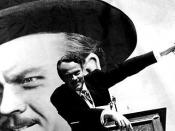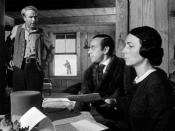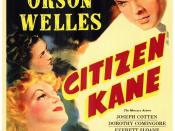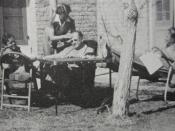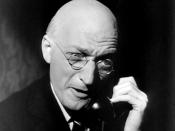"Charles Foster Kane- a whole collection of a jigsaw puzzle"� In the course of Citizen Kane, Thomson attempts to define Charles Foster Kane by Kane's last word, Rosebud. Mr. Rawlston insists Thomson to search for the meaning of Rosebud presuming that it holds the key to understand Kane believing that "Maybe he told us all about himself on his deathbed."� In series of interviews with Kane's close associates, however, Thomson realizes that a man cannot be understood by defining a single word but can be recognized by comprehending the intricate collection that comprises a man. This change of Thomson's belief in understanding Kane can be seen in Thomson's attitude in each interview. Each interview reveals different perspective of Kane, which constructs the collection of Kane's life. The essentiality of understanding a man in a sense of a whole collection is also discovered as each interviewees, and even Kane himself, fail to define Charles Foster Kane when they focus only on one aspect of Kane.
Though not through an interview, the film exhibits Thatcher's negative perspective on Kane regarding materialistic aspect. Through the montages in the beginning of the film and Thomson's visit to the Thatcher library it is clearly shown that Thatcher was very detached from Kane and was always overly concerned about materialistic features. The relationship between Kane and Thatcher was very impersonal and cold. In the short scene of Christmas, the young Charles' face is full of dissatisfaction even though he was given ample gifts. The later scenes in the film further reveal the impersonal relationship between the two. Thatcher views Kane as a "scoundrel"� who is irresponsible and inconsiderate, especially in business. Thatcher gets thoroughly upset that Kane would not run the "sixth biggest private company"� that was given to him for his twenty-fifth birthday. Instead, Kane decides to take over the paper Inquirer commenting, "I think it's gonna be fun to run a newspaper."� The dissatisfaction of Thatcher only increases when Kane shows his disinterest in money and materialistic aspect when Thatcher visited Kane while Inquirer was going downhill. Unhappy Thatcher enters the room and Kane introduces Thatcher, " This is my ex-guardian. He is one of our most devoted readers. He knows everything that's wrong about our paper,"� indicating the unhappiness of Thatcher about Kane running the newspaper. When Thatcher reminds Kane of the money loss, Kane shows his great indifference in his profit by saying, "I lost a million dollars first year, I lost a million dollars last year, I expect to lose a million dollars next year. With the rate of a million dollars a year, I will have to close in sixty years."� After losing the Inquirer, Kane admits, "I always gagged on that silver spoon. If I hadn't been very rich, I might have been a really great man,"� showing the great difference in perspectives between Thatcher and Kane, which even more remotes Kane from Thatcher. He further says a hostile comment that he wanted to be "everything you [Thatcher] hate,"� revealing his discontentment with Thatcher.
While discovering these aspects of Kane's life, Thomson still shows a strong desire to discover Kane's last word, Rosebud. When visiting the Thatcher library, he clearly points out that he is "just looking for one thing."� Even after Thomson discovered Kane's unfortunate childhood, he neglects the importance of the finding and goes on searching for Rosebud. When Thomson was asked if he had found the thing that he wanted, he gives a discontent response "No,"� and goes on asking the library guard if her name is Rosebud, showing his strong passion in the word.
However, as Thomson goes on to the next interviewee, Bernstein who adores Kane, he makes a progression in attitude toward "ÃÂcollecting'. However, he does try to initiate the conversation by saying, "If we could find out what he meant by his last words,"� "About Rosebud, Mr. Bernstein"� to which Bernstein responses, "maybe that was something he lost."� Though still concerned about the meaning of Rosebud, Thomson begins to be interested in the meaning of the collection of the life. Apart from Thomson's effort of discovering Rosebud, the interview with Bernstein reveals the heroic perspective of Kane. The first apparent evidence that Kane is a hero to Bernstein is the fact that Kane's large portrait appears over Bernstein's office. Bernstein also reminds Thomson that Kane's circulation boosts over eighty two thousand, the highest in New York. Bernstein, on the other hand, tries to skim over the unpleasant parts of Kane's life"" his unsuccessful marriages"" just giving a fast comment, " It [his marriage to Emily] ended. Then there was Susie. That ended, too."� He also disapproves Thatcher who had a rather detached relationship with Kane saying, "Thatcher never did figure him out."� By presenting Bernstein's point of view, Kane appears to be a charismatic and a heroic character while Thomson still holds his interest in finding Rosebud.
The interviews with Leland and Susan Alexander develop Kane's negative aspects such as his inability to love others, selfishness, and his need of being in control. In these scenes, Thomson's remarkable disinterest in Rosebud can be observed. Instead, he goes on asking other questions steering the conversation that leads to answers of different perspectives of Kane. Leland had a biased view on Kane that he is very self-considered. He comments that, "he did brutal things,"� "He never believed in anything but Charles Kane."� Especially after Kane lost his election Leland harshly comments, "You don't care about anything except you."� This aspect of Kane's personality is more highlighted during the interview with Susan Alexander. During the flashback of their marriage, Susan accuses Kane for his inability to love anyone but himself by saying, "You don't love me. You want me to love you. I'm Charles Foster Kane. Whatever you want just name it and it's yours, but you gotta love me."� Moreover, Kane's attitude toward Susan exhibits his strong need for control generated from his self-centered-ness. Even though Susan refused to sing in the opera due to embarrassment and humiliation, Kane orders Susan, "You will continue with your singing."� In the later years of marriage, Kane almost imprisons Susan in his palace in Xanadu despite her requests of trips to other cities or picnics. He only leaves on the occasions that he had arranged for her. Here, the film places scenes of Susan completing jigsaw puzzles in an attempt to explain that Kane is a collection of many different perspectives instead of one piece. Kane's need for control was portrayed several times outside of his marriage to Susan. Kane often insists that the people will think "what I tell them to think,"� indicating his strong desire of control. As a collection, Thomson's interviews with Leland and Susan present another perspective of Kane"" his selfishness, inability to love others and his need of control.
While revealing negative side of Kane, Leland and Susan's interviews also create the feelings of pity for Kane. Leland is one of the closest "ÃÂfriends' of Kane who went to colleges together and thus might have some good understandings of Kane. However, Leland refuses to show this and rather leaves Kane immediately after Kane loses his election and Emily. Susan's departure from Kane further induces sympathy toward Kane from viewers of the film. Old and pitiable Kane begs Susan, "Please don't go,"� and promises her that, "Everything will be exactly the way you want it to be."� But, Susan leaves him which destroys Kane's life, invoking further request of sympathy from the viewers.
In the closing scene of the film Citizen Kane, Thomson admits that Rosebud was just "a piece of jigsaw puzzle"� that does not hold much importance in understanding Kane. Additionally, Thomson realizes that Rawlston's presumption, "Maybe he told us all about himself on his deathbed,"� was incorrect and suggests the correct way to understand a man"" to understand him as a whole collection of a jigsaw puzzle rather than from a single piece. Every character including Kane himself in the film does not seem to grasp this idea of defining a man and thus misunderstands him with biased points of view concentrated only on one piece of the puzzle which results in unsuccessful relationships with Kane. The strong evidence that Rawlston's assumption was wrong is given at the very end of the film; Rosebud was just a word that was written on Kane's sled from his childhood. Obviously, the word is not even enough to define or represent one perspective-one piece of jigsaw puzzle- of Kane's life.
In the film Citizen Kane, Thomson's philosophy in defining Charles Foster Kane and men in general changes from his assumption that Rosebud as the key to understand Kane to his belief that Kane and human beings are best defined as a whole collection of different perspectives. Each interview, a collection that reveals different aspect of Kane serves as a part of the whole collection of Charles Foster Kane. Though each interview is a part of the whole collection, it cannot alone define a man"" it has to be an intricate collection of the whole jigsaw puzzle.
